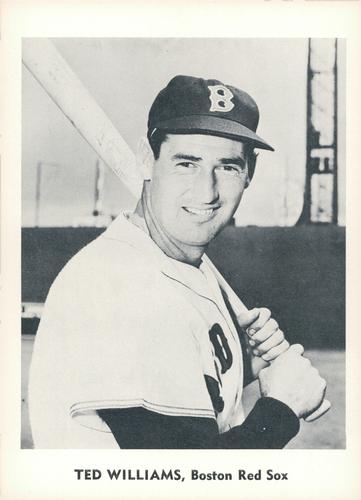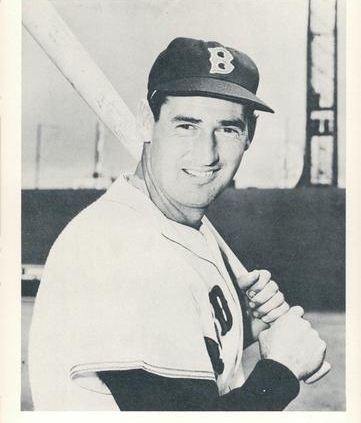August 20, 1960: Ted Williams draws career walk 2,000, then hits two 3-run homers
 His first time up on August 20, 1960, in the final season of his 19-year career with the Boston Red Sox, Ted Williams drew a walk. It was career base on balls number 2,000.1 Only one player had ever walked more – Babe Ruth, who’d earned 2,062 walks.2 Ted got walk number 2,000 in his 2,260th game; he wasn’t far off from averaging a walk a game.
His first time up on August 20, 1960, in the final season of his 19-year career with the Boston Red Sox, Ted Williams drew a walk. It was career base on balls number 2,000.1 Only one player had ever walked more – Babe Ruth, who’d earned 2,062 walks.2 Ted got walk number 2,000 in his 2,260th game; he wasn’t far off from averaging a walk a game.
He is the player with the highest percentage of walks to plate appearances in baseball history – 20.64 percent. More than once in every five times to the plate, he got a free pass to first base. Ruth’s walks percentage was 19.40 percent.3
It was never a personal goal, but instead a byproduct of what Williams had been told by Rogers Hornsby and always tried to put into practice – patience. “Get a good ball to hit.”4
Bob Feller: “You had to throw strikes to him. He would not swing at a ball unless it was over the plate – or he thought it was. He seldom ever took a called third strike that I know of.”5
Some charged that Williams was too selfish, turning his nose up at balls that were close but not over the plate, taking a pitch for a ball instead of hitting it and maybe driving in a run. “If I were selfish as charged,” he said, “I’d swing for home runs all the time, good pitches or bad. I’d end up with more home runs and fewer walks. But you still have to win the game, and whether certain people believe that or not, that is what I am after.”6
Of course, it wasn’t the walks that got Williams a standing ovation when he came to the plate in the eighth inning. It’s because he had already hit two three-run homers in the game, the first in the fourth inning and the second in the sixth. The second one was the game-winning hit.7
The Baltimore Orioles were at Fenway Park for a Saturday doubleheader. The Orioles were in third place in the American League, just two games behind the first-place New York Yankees. The Red Sox were seventh, 18 games back. Boston’s manager, Pinky Higgins – back for a second stretch as skipper – selected Bill Monbouquette (12-9, 3.34) to pitch. Paul Richards of the Orioles chose 22-year-old rookie right-hander Chuck Estrada (13-7, 3.44).
Monbouquette got off to a rocky start. Center fielder Jackie Brandt singled to lead off the Orioles’ first. After two outs, first baseman Jim Gentile walked. The shortstop, Ron Hansen, hit a three-run homer, his 18th of the season, and the Orioles had a 3-0 lead.
With one out in the bottom of the first, Red Sox center fielder Willie Tasby singled. Williams drew his milestone walk. But the inning ended with them both stranded. The Red Sox loaded the bases in the bottom of the second, but again did not score.
Williams reached on a checked-swing single to second base to lead off the bottom of the third. An error by first baseman Gentile allowed Vic Wertz to get on base and Williams to take third. Catcher Russ Nixon singled and Williams scored. Three strikeouts in succession enabled Estrada to close out the inning.
Monbouquette set down the Orioles in order in the third and fourth. With one out in the bottom of the fourth, second baseman Pete Runnels was hit by a pitch and Tasby singled to left. Ted Williams put the Red Sox in the lead, 4-3, with what the Boston Herald called “a hightowering hoist”8 – a three-run homer into the Red Sox bullpen. It was the 514th home run of his career.
Baltimore rallied against Monbouquette in the fifth and sixth. In the fifth, back-to-back singles by Brandt and right fielder Al Pilarcik set the table for Brooks Robinson, who doubled to right field. Brandt scored easily, but a strong throw from Lou Clinton in right field got Pilarcik before he could reach third base. The score was tied, 4-4.
The Orioles took the lead again in the top of the sixth. Hansen singled to left. Gus Triandos flied out to center field. Gene Woodling pinch-hit for left fielder Dave Nicholson and the move paid off, Woodling hitting a triple that drove in Hansen. After second baseman Marv Breeding struck out, pitcher Estrada singled, driving in Woodling. It was 6-4, Baltimore.
In the bottom of the sixth, Pumpsie Green pinch-hit for Monbouquette and hit a double to right field, but was thrown out trying to stretch it to a triple, Pilarcik to Hansen to third baseman Robinson. Runnels singled and so did Tasby, and manager Richards left Estrada in one batter too long. Ted Williams swung at the first pitch and hit a three-run homer, lifting Boston to a 7-6 lead. The home run was pegged at 430 feet. It landed “six or eight rows into the bleacher crowd between the end of the bullpen and the flag pole” in center field.9
Billy Hoeft took over from Estrada, pitched to two batters, and retired one of them. Jack Fisher then relieved Hoeft and got the third out.
Mike Fornieles was the reliever tabbed to replace Monbouquette in the seventh. He retired the Orioles in order.
The Red Sox added an insurance run in the bottom of the seventh. Lou Clinton tripled to right field and Don Buddin singled past a drawn-in infield to send him home.
Fornieles allowed a single to Hansen in the eighth and a single to Brandt in the ninth, giving each of them three hits in the game. He didn’t allow any runs to score.
Ted Williams batted in the bottom of the eighth but grounded out. Carroll Hardy replaced him in left field for the top of the ninth.
This was the last multiple home-run game of Ted Williams’s career, coming 10 days after he hit two homers on August 10 against the Cleveland Indians. The pair of three-run homers were the last two three-run shots that Williams hit. He drove in six of Boston’s eight runs, and they needed them. The final score was 8-6. The second one was the game-winner and the 109th game-winning home run of his career.10
Estrada finished the season 18-11, his 18 wins leading the American League. Monbouquette got the win, improving to 13-9.
In the day’s second game, former Boston pitcher Hal “Skinny” Brown shut out the Red Sox, 6-0, beating Earl Wilson and earning a split for the Orioles. Williams pinch-hit late in the game and grounded out.
Acknowledgments
This article was fact-checked by Laura Peebles and copy-edited by Len Levin.
Sources
In addition to the sources cited in the Notes, the author consulted Baseball-Reference.com, Retrosheet.org, and his own 521: The Story of Ted Williams’ Home Runs (Cambridge, Massachusetts: Rounder Books, 2013).
https://www.baseball-reference.com/boxes/BOS/BOS196008201.shtml
https://www.retrosheet.org/boxesetc/1960/B08201BOS1960.htm
Notes
1 Based on the Overview and Game Logs on Baseball-Reference, and his career summary on Retrosheet, Williams finished his career with 2,021 bases on balls. If that was correct, his 2,000th walk would have been in the game on August 16, 1960. However, as detailed in their “discrepancy” file, Retrosheet has determined that Williams’s correct career total is 2,018 and therefore his 2,000th walk was on August 20 as reported in the newspapers of the day.
2 In more recent years, Barry Bonds drew 2,558 walks and Rickey Henderson drew 2,190. Williams ended up with 2,021. He did, of course, miss most of five seasons due to military service.
3 Three other players who have completed their careers rank in the top five. In second place is Barry Bonds (20.29 percent). in third is Max “Camera Eye” Bishop (19.96 percent), and in fifth place is Ferris Fain (18.43 percent).
4 Ted Williams and John Underwood, The Science of Hitting (New York: Fireside Books, 1970), 20.
5 Dave Heller, Facing Ted Williams (New York: Sports Publishing, 2013), 38.
6 Ed Linn, Ted Williams: The Eternal Kid (New York: Thomas Nelson, 1961), 130.
7 A “game-winning home run” is defined here as a home run that provides a game’s final margin of victory, giving the winning team at least one more run than the opposing team scored. For example, if a two-run homer increased a team’s lead from 2-1 to 4-1, and the team went on to win 4-3, it qualifies as a game-winning home run. (This is different from the definition of “game-winning RBI” in baseball’s official statistics from 1980 through 1988, which counted as “game-winning” the RBI that provided a winning team the lead that it never relinquished.)
8 Henry McKenna, “Ted Hits Two 3-Run Homers,” Boston Herald, August 21, 1960: 53.
9 McKenna.
10 Bill Nowlin, “The Kid” Blasts a Winner: Ted Williams’s 110 Game-Deciding Home Runs (South Orange, New Jersey: Summer Game Books, 2022), 256-257.
Additional Stats
Boston Red Sox 8
Baltimore Orioles 6
Game 1, DH
Fenway Park
Boston, MA
Box Score + PBP:
Corrections? Additions?
If you can help us improve this game story, contact us.


